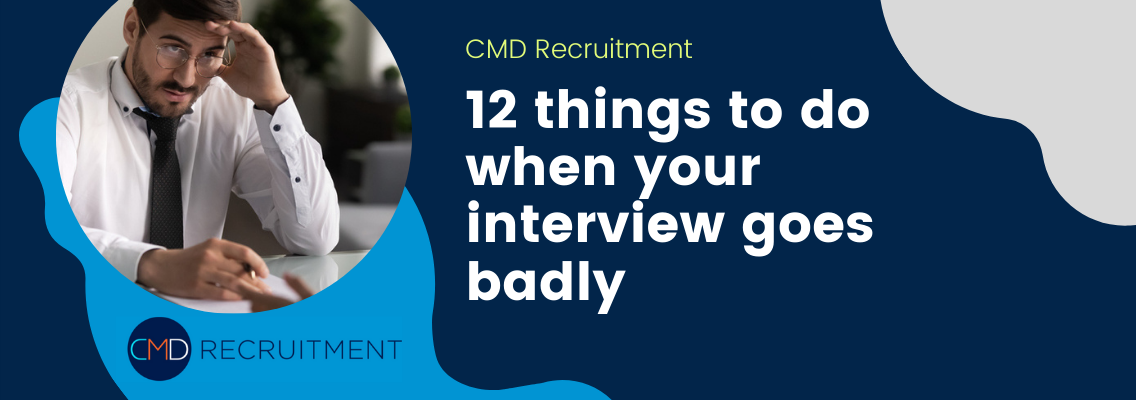Important notice - We are aware of a scam where people are impersonating CMD Recruitment to offer jobs via WhatsApp & Telegram. This is a scam, CMD Recruitment will never contact new candidates via these methods. Any legitmate offer from CMD Recruitment would be made via a telephone call.

May 16, 2022
We’ve all faced bad job interviews, but knowing this doesn’t make the situation any easier. When you have your heart set on a particular role with a particular company, it can be devastating when the interview doesn’t go quite as well as you would hope.
Job interviews are nerve-wracking experiences, and it’s not uncommon for even the most experienced professionals to have a bad interview now and again. The important thing is to learn from your mistakes and move on. Here are 12 things you can do when your job interview goes badly.
Easier said than done, but you really need to give yourself a break after a bad interview. It’s not the end of the world, and it doesn’t mean that you’re a terrible candidate. Everyone has off days, and interviews are notoriously tricky to nail 100% of the time.
Even if you feel like the interview has been a disaster, keep your cool and remain composed until you have left the premises. You’d be surprised to learn how many interviews have been sabotaged by candidates thinking that they performed poorly, and then let a poor attitude ruin the rest of the interview. You simply don’t know how it has gone, so keep your head held high until you have confirmation of the outcome.
Once you’ve taken a step back from the situation, it’s time to analyse what exactly went wrong. Were you unprepared? Did you get tongue-tied when asked a particular question? Did you come across as arrogant or entitled? Be honest with yourself so that you can learn from your mistakes and improve next time.
There are no bad interviews, only learning opportunities. So if you spot weaknesses in your performance, it’s time for some self-reflection and self-improvement to make sure that you don’t let the same mistakes happen twice.
Your friends and family are there to support you through the good and the bad times. So if you’re feeling down about a bad interview, talk to them about it. They’ll be able to offer some helpful perspectives and make you feel better about the situation.
It can also be helpful to discuss your experience with people who have been in a similar situation. They’ll be able to relate to what you’re going through and offer advice on how to deal with it. Your friends will likely all have tales of similarly bad interviews, so don’t be afraid to lean on them for support.
When you feel disappointed in your performance, this can damage your confidence, so now is not the time to be launching into more job applications. Give yourself a break to recover from the bad experience.
This doesn’t mean that you should give up on your job search altogether, but rather take some time to recharge your batteries. When you’ve gained some perspective and feel a little more confident, you can resume your search.
A bad interview doesn’t mean that you’re a bad candidate, but it highlights areas where you can improve. If you didn’t give the best impression of your abilities, it might be time to return to your CV and cover letters and make sure you are familiar with what you bring to the table.
You might also consider tailoring your CV and cover letter to the specific role you applied for. If you struggled to make a good first impression, this could be down to their perception of you from your cover letter and CV.

One of the best ways to avoid a bad interview is to practice in advance. You can find lists of common interview questions and situational questions online. Practice how you would answer these questions so that you can make sure you always give an excellent impression of your skills and abilities. Practising your answers will also help you to feel more confident and prepared when you go into an interview.
If you’re well-prepared for an interview, you should already have a good understanding of the company. However, if you find yourself being caught off-guard by questions, this could mean that you aren’t researching the role effectively enough. Speak to your recruiter to find out more about the company and make sure you have a good understanding of the role before your next interview.
If you didn’t do as well as you hoped in an interview, it can be helpful to ask for feedback from your interviewer. They might be able to offer some constructive criticism. They might also reassure you that the interview wasn’t as poor as you thought.
Something as simple as your body language could have let you down. Your body language says a lot about you, so it’s important to be aware of how you’re coming across. If you’re slouching or fidgeting, this can make you seem uninterested or nervous.
If you’ve had a bad interview, there’s no harm in trying to salvage the situation by connecting with the hiring manager on LinkedIn. If they’re impressed with your profile, they might be willing to give you another chance.
This is also an excellent way to stay at the front of their minds when another role becomes available. The process of advertising for a new role can be time-consuming, so you would be doing them a favour by letting them know you’re interested in hearing about other roles that may arise in future.
Even if you didn’t do as well as you hoped in an interview, it’s important to send a thank-you note. This is just good manners, and it shows that you’re grateful for the opportunity.
It might also remind the interviewer of your interest in the role and help them to remember you when they are making their decision. A handwritten note would be ideal, but you could also consider simply sending a thoughtful email.

A bad interview can be disheartening, but it’s important to keep your chin up. Remember that everyone has had a bad interview at some point in their career. What counts is how you recover from it. Learn from your mistakes and use them to improve your performance next time around.
Once you’ve taken the time to reflect on your bad interview, it’s important to move on to the next opportunity. Don’t dwell on your failures; instead, focus on what you can do to improve your chances of success in future.
Bad interviews happen to everyone – even the most experienced and qualified candidates. The key is to learn from your mistakes so that you can perform even better the next time. When you start to take the attitude that every interview is just preparation for the next interview, you quickly learn to pick yourself up after a bad interview. Don’t beat yourself up for losing out on “the dream role” as there will be plenty of other roles to consider in the future.
Back to Blog